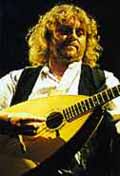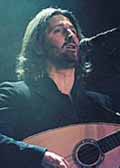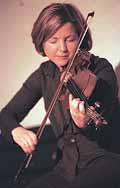 |
||
The Living Tradition
|
|
|||
| Where are the young singers? |
|
|||
|
{graphic} |
||||
|
TODAY'S FOLK SCENE is barely recognizable when compared to the
early Sixties Revival. Now, that statement shouldn't occasion an instant
gloomy ballad on the Decline Of The Tradition, and so on. It's simply a fact. There's been great
change losses, but clear gains also. In many ways, the music is pretty
healthy in Scotland and Ireland, although rockier in England. One area
stands out, of course, the huge growth in the amount and quality of playing,
particularly amongst young people. We're worlds away from the earliest
days. Then, instrumental work was often rough. And certainly rare, as
Archie Fisher says: "At the 1967 Blairgowrie Traditional Music Festival, there was just one melodeon player flying the flag, one Northumbrian piper, one
fiddler, one whistler and all
of them, Colin Ross!" Yet if playing is advancing, is singing,
which after all led the Revival? Well, no, sadly it isn't. Rather the
opposite. Ireland largely excepted, singing is struggling in these islands
despite no lack of good songs, new and old. In some places, singers are
quite rare. Worse, tensions and even splits are even occurring between
them and instrumentalists. The music's core values of communality and
mutual respect are at risk as some sessions and clubs
become virtually tunes only or songs only. The shifting balance between singers
and players has many roots. For a start, singing's early primacy was fostered
by the politics of the day. There was change in the air, and big issues
to sway people, like nuclear weapons. And strikes: it was no surprise
that key to the Revival was England's north east, with its heavy industry.
For would be singers, it was all a heady brew, with heroes a plenty, Baez,
McColl, McNaughtan, Dylan. Their songs, it seemed, could be sung by almost
anybody. Even pop, with its simple structures and melodies, was very singable
compared with now. Singing, in short, made sense. Today's situation could be hardly more
different, as shown by the lack of young singers, especially males. From
sessions to stages, singers are typically middle aged. They are, in fact,
mainly that Revival cohort, with some welcome later additions. Waistlines
thickening (as this writer should know!), hair greying and the rest, their
enthusiasm is undimmed and many are singing better than ever before. But
middle aged they undoubtedly are. And they won't go on for ever. So, where are those who would eventually
replace them? Very thinly scattered,
it seems. Ireland's problems here are smaller, but then that's a country
deeply respectful of song. Scottish Gaeldom boasts several fine young
artists (mostly women), like Fiona Mackenzie, and amongst non Gaelic Scots
there are superb performers like Karine Polwart. Scottish male singers,
however, are sparser. Amongst the best would surely be Jim Malcom and
John Morran. England, more populous,
can muster proportionally more fine singers, the likes of Tim Van Eyken,
Kate Rusby and Jon Boden. Yet neither country is overloaded with them,
professional or amateur. Some parts of Britain may be virtual ‘song deserts'.
George Butterworth of the Folk Bus project says of Dumfries and Galloway:
"We've got none here. Actually, in local sessions I sense
that many people, of all ages, think song's boring".
One thing behind this apparent dearth
of singing is the rise of sessions. Probably most traditional music now
is heard in them, by folkies and non folkies alike. Clubs are relatively
declining. Scotland, for example, has lost half its complement in the last twenty years. But pub sessions are plentiful,
fast ‘n' furious and overwhelmingly tune driven. "I could attend
sessions in Glasgow every night", says music student Jenn Butterworth,
George's 19 year old daughter. "They'll be mostly tunes, with perhaps
the odd Gaelic song when Islanders turn up. Sessions are about fun, and
honestly, young people find the old songs rather depressing when they're
out to enjoy themselves. They certainly aren't keen on unaccompanied singing.
I don't know anybody my age doing it. I love the music myself, but I'm
just giving the truth". The wildness of pub sessions certainly
attracts. "However", says George Butterworth, "as a musician,
I dislike the endless fast reels. They might sound good, but it means
that even a slow air hasn't much chance, never mind singing. And that's
assuming singers could be heard, given the normal noise level". He
sees a certain ‘selfishness' in this, an ignoring of other people's potential
contribution. He's equally aware, however, of the reverse ; domination
through wall ;to wall songs. It would be wrong to pillory the (stereotyped)
fast tune session as causing
a lack of singers. It may largely be a symptom, albeit one exacerbating
other problems. There are perhaps some interesting gender politics abroad,
thinks Jenn Butterworth. "Players are mostly male, singers female,
but women instrumentalists are increasing now. Might men lose their place?
Even sing more? Until now, peer pressure on men is that girls do singing.
A status thing?" Singer, musician and educator Sandra Kerr has another
view. "It was basically once much easier for men to sing. Young or
old, they could identify with all that industrial song (‘though women
correspondingly couldn't). But now the industry's gone, and you just can't
get fired up over computer assembly in the same way". There seem to be prestige differences
between singing and playing. Put simply, people take singing for granted
but are in awe of playing. "That's particularly true of youngsters",
thinks George Butterworth, "there's almost a snobbery about being
able to play very fast". The belief is that ‘anybody can sing' (true,
although not necessarily well) whereas playing equals ‘real' skill. "It
does", says Jenn Butterworth, "but I think singing demands more.
Play a tune, and everyone joins in, supporting you. That's a smaller step
than standing up and singing, even accompanying yourself, with everyone's
eyes on you". Johnny Handle goes further: "Frankly, flashy playing
is easy, but singing takes far more out of a performer. You can't hide
behind an instrument, you actually have to think,
you're far more emotionally vulnerable. I wish more instrumentalists understood
that". Something else is at issue also singing
being no longer normally done in schools, even Primary ones. Arguably,
that encourages what later becomes peer
pressure against singing. "Singing
isn't cool, except in rock",
asserts 14 year old Glaswegian Jemima Sutherland. "I like songs like The Wife Of Usher's
Well, but my friends would just call that weird". Singing (or playing)
folk has always been a minority interest, of course, yet it's worrying
if it's being so totally scorned by the young. "Pressure on youngsters
to conform is terribly harsh, so much of it's about consuming", thinks
George Butterworth. "I often hear folk called ‘not cool'". Young
enthusiasts face isolation, which takes spirit to handle. "Nobody
at my school likes folk", sighs 14 year old Northumbrian, Sarah Hayes,
a song finalist in this year's Radio 2 Young Folk Awards. "But I
love the music, it's funny being part of this big folk thing that my friends
know nothing about. But it makes me sad there's nobody of my age here
to sing with me". The effort to turn the young into conforming
consumers will increase. Already, there's a new target, so called ‘tweenagers',
a potential ‘market' apparently worth 」11bn. The thrust, of course, will be to further separate the generations,
to tackle the troublesome problem of parents' values impinging on their
childrens' lives. That thrust has implications for youngsters getting
into folk in the first place. There may be effects already, shown
by what some see as a growing gap between young and old in folk. Generations
fretting about each other isn't exactly new, of course. Youth is rightly impatient and passionate, always wanting to
push the limits. If it didn't, music would die. But things have to relate
to what could loosely be called ‘the tradition' and its associated values.
That implies a balance between various elements, tunes and songs at least,
and perhaps story and dance, too. Non stop playing (and that's certainly
not a feature of young musicians alone) isn't about balance. Nor is non
stop singing. Tunes and songs should complement each other, not compete.
Some observers of the scene suspect that some youngsters simply aren't
aware of what they're part of (as clearly Sarah Hayes is). "I've
knocked around with Jenn and her pals, at Sidmouth, Whitby etc.",
says George Butterworth. "It's all the new tunes from Flook and Liz
Carrol good tunes, but the youngsters rarely show
interest in the existing repertoire. I honestly doubt they're conscious
of what they're doing". "There is an issue",
believes Johnny Handle. "Take ‘World Music'. The basic idea's ok
but too many youngsters aren't learning enough about their own culture
first. But you just can't sing north east songs if you don't know what
they mean in terms of places, people, history, landscape, beliefs, the
lot". There are other voices, too. Even the famously gentle Cathal
McConnell ventures "Some of the youngsters are sometimes a wee bit
lacking in the tradition". Fellow Ulsterman Kevin Mitchell is more
trenchant about some young musicians: "Great players, of course,
but that's all they want to do play.
They don't seem to know the ‘rule', that you give people space, that you
put your instrument down and listen to an unaccompanied song, maybe. Many
youngsters, I'd say, don't have any real respect for the singing".
He goes on to add, pointedly and accurately, "not
just youngsters, either" . Crucial for young people joining the
folk world are role models. Would be instrumentalists have no problems,
there are Michael McGoldrick, Flook, numerous others. But singers? "Not
so easy", says Sandra Kerr, "but role models are important as
I know myself, from starting out with Ewan McColl". Jenn Butterworth
finds things alright for women: "It's easier, what with Eliza Carthy,
Bill Jones and Kate Rusby around, but
difficult for men". Sandra Kerr's 25 year old daughter Nancy,
herself a singer, player and teacher agrees: "I see it a lot in my
teaching, no role models for men. I reckon it only needs a couple of really
good male singers to get them singing. But there needs to be emphasis
on song. Even when Carthy does workshops, I think he concentrates
more on accompanying. Where are the male role models? Even on the
trad. music degree at Newcastle, I think all the singing tutors are female". A major role model for 24 year old Jon Boden
from Winchester, noted for accompanying his singing with fiddle, was actually
Eliza Carthy. He hadn't known of Barry Dransfield. Unfortunately, there are snags with
role models some, perhaps older ones, might just be too good. "If you hear the likes of
Dick Gaughan or Nic Jones", says Jenn Butterworth, "mightn't
you just give up trying? I mean, how can you follow that?" Sandra Kerr found much the same at one of her
workshops: "I played Joe Heaney as an illustration, there wasn't
a dry eye there, people asked ‘How can you get anywhere near that?'" ‘Through being supported' and ‘self confidence' are maybe part answers. Being
reared to the music helps, having a family or some similar connection
to it. The seeds of the tradition have to be sown somehow. They obviously
were for Jenn Butterworth and Nancy Kerr. As for Sarah Hayes, her parents
aren't themselves traditional musicians but have a love for the music,
which included taking her to see Battlefield when she was quite little.
(She has another advantage, of course, that of living opposite Sandra
Kerr!) Good fortune also gets people into
folk, Jon Boden for one. As a youngster, he regularly attended camps linked
to The Woodcraft Folk. "It was great, there was lots of fireside
singing, not really traditional, just anything, mostly unaccompanied.
Good or bad, you could sing your heart out. You got praise for it and
it was presented as an absolutely normal thing to do. Non competitive
too, importantly. Campfire songs maybe get many people started".
Fortune smiled on him later, too. When at Durham University, he discovered
a very unusual music session. "It was just middle aged men in a pub,
they'd argue about football one minute, then would drop into a lovely
tender song, unaccompanied. Then it would be chat again. It wasn't like
a folk club with everybody watching you. That's hard for beginners. But
that pub really helped me". He makes as living out of music, he
says. He's lucky, but as this article has tried to show, luck isn't generally
enough. It simply doesn't seem as easy for young people to get into folk
as formerly. There aren't enough role models (particularly for singers),
the enlivening politics aren't around, performing venues may be a problem,
there's negative peer pressure, audiences don't demand songs, especially
unaccompanied. Not, it seems, a happy picture. But wait... There's no need for that
gloomy ballad yet... Because many organisations are working to change
things through workshops, folk choirs, academic courses, the internet.
Next month's magazine will see a follow up on all these varied initiatives.
And for singing, there may already be straws in the wind. Of England,
says Nancy Kerr: "I see a few young guys starting singing now. I
can only explain it by the fact that the repertoire's always been
there and it's so good. There are gorgeous songs for men in the English
tradition and now the guys are discovering just how gorgeous". Steve McGrail
|
||||
| Related Links |



